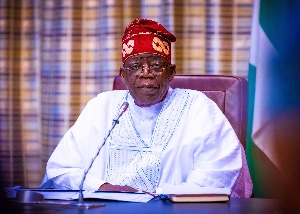- Home - News
- Elections 2024
- News Archive
- Crime & Punishment
- Politics
- Regional
- Editorial
- Health
- Ghanaians Abroad
- Tabloid
- Africa
- Religion
- Photo Archives
- Press Release
General News of Friday, 25 April 2025
Source: www.ghanawebbers.com
More Nigerians will become poor by 2027 — World Bank
The World Bank predicts that poverty in Nigeria will rise by three percentage points by 2027. This projection comes from the Africa Pulse report, released during the Spring Meetings of the IMF and World Bank in Washington, DC.
The report highlights serious poverty issues in Nigeria. It notes some positive signs in economic activity. However, challenges related to resource dependence and fragility are expected to worsen poverty levels. The report calls for effective governance reforms and inclusive economic policies.
Nigeria experienced unexpected economic growth in late 2024, especially in its non-oil sector. Despite this, its status as a resource-rich and fragile nation poses risks for poverty reduction.
Poverty rates in resource-rich, fragile countries like Nigeria are projected to increase by 3.6 percentage points from 2022 to 2027. This makes Nigeria unique among Sub-Saharan African nations with rising poverty rates.
Sub-Saharan Africa has the highest extreme poverty rate globally. A significant portion of the world's extreme poor lives there. In 2024, about 80 percent of the estimated 695 million extreme poor resided in Sub-Saharan Africa.
In contrast, only 8 percent lived in South Asia and even fewer elsewhere. Within Sub-Saharan Africa, half of the extreme poor live in just four countries. Non-resource-rich countries are expected to reduce poverty faster than those rich in resources.
Higher agricultural commodity prices will boost growth for non-resource-rich countries despite fiscal pressures. Resource-rich countries will not grow as quickly due to falling oil prices. Consequently, they will see less progress in reducing poverty.
Poverty is expected to rise by 3.6 percentage points from 2022 to 2027 in resource-rich fragile countries like Nigeria and the Democratic Republic of Congo. This trend follows a pattern where resource wealth combined with fragility leads to high poverty rates—averaging 46% in these nations.
Non-resource-rich, non-fragile countries have made significant gains since 2000 and closed their poverty gap with other nations by 2010. The report emphasizes that improving fiscal management is crucial for resource-rich countries like Nigeria.
Developing a stronger fiscal contract with citizens is also essential for progress against poverty.











